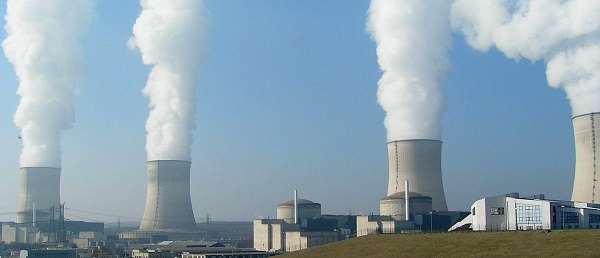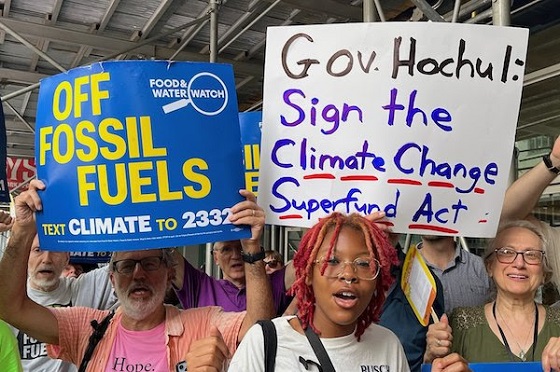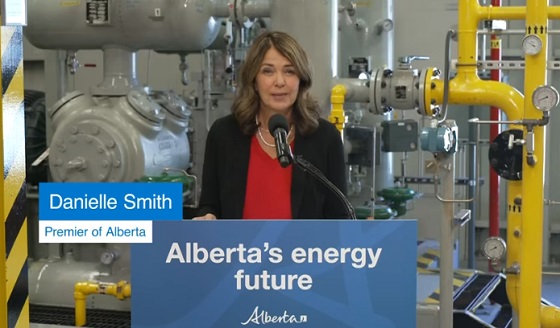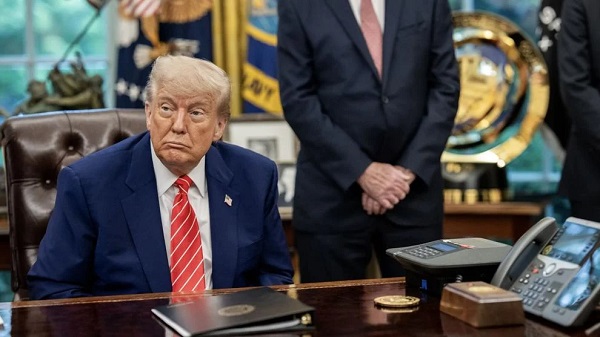Daily Caller
Trump’s ‘Massively Ambitious’ Nuclear Power Goals Might Save US From Rolling Blackouts


From the Daily Caller News Foundation
By Audrey Streb
While the Trump administration has been sounding the alarm over an imminent national energy crisis, it has also set aggressive nuclear expansion goals that industry insiders told the Daily Caller News Foundation may be achievable despite their ambitious scale.
The Trump administration has set a goal to quadruple nuclear power in the U.S. by 2050 and has moved to boost the energy technology through a smattering of executive actions. Though not every nuclear target outlined by the administration may be met, Trump has signaled that the U.S. could dramatically expand nuclear power in the coming years which is vital as blackouts loom and the artificial intelligence (AI) race accelerates, industry insiders told the DCNF.
“It’s going to be tough, but America has stepped up to plenty of major challenges like this in the past,” Benjamin Reinke, senior vice president of nuclear company X Energy and former executive director of the Office of Strategic Planning in the Department of Energy (DOE) under Trump’s first administration, told the DCNF. “Renewed focus on energy reliability certainly is a tailwind for the nuclear sector because of the attributes of advanced nuclear power. The opportunity to capture and win the global AI race with China is something that the U.S. has [to do].”
Dear Readers:
As a nonprofit, we are dependent on the generosity of our readers.
Please consider making a small donation of any amount here.
Thank you!
President Donald Trump signed four May 23 executive orders to clear hurdles for nuclear energy and set ambitious goals to expand the industry. Several nuclear energy sector insiders that spoke with the DCNF are gambling that America will be able to accomplish several of the goals outlined by the Trump administration, even if they are hesitant to believe that power generated from nuclear power could quadruple as soon as 2050.
Several energy insiders warned that it is vital to expand nuclear power now as it is a highly reliable energy resource, and widespread rolling blackouts are being forecasted by several analyses including one July report by the DOE that states blackouts could increase by a factor of 100 by 2030. Power demand is surging for the first time in decades and electricity consumption is projected to surpass the all-time 2024 high, according to the Energy Information Administration (EIA).
As the sector continues to boom, the industry will bring new jobs, technological innovations and power-hungry data centers. Nuclear advocates argue that the energy resource is well equipped to do the heavy lifting for the U.S. power grid.
Nuclear power plant generation has been declining in the U.S. since the 1990s and America has only managed to build two large nuclear reactors in the last 20 years. The newest reactors came online in Georgia nearly two decades after the projects began, running billions over budget and years behind schedule.
Big Tech is looking to nuclear as an attractive option to power its data centers and has considered adding small modular reactors (SMRs) as well as reviving shuddered nuclear plants to solve their power problems. Several states are seeing a revival in nuclear technology, with Microsoft making a deal to resurrect Three Mile Island in Pennsylvania and New York moving to open a new reactor after shuddering one just a few years ago. Additionally, the Michigan Palisades plant scheduled to reopen in October will mark the first defunct nuclear plant to return from the dead.
“Unlocking nuclear energy will be critical for meeting growing demand for affordable, reliable baseload power needed to fuel the AI race – our next Manhattan Project – while powering Americans’ homes and businesses,” a DOE spokesperson told the DCNF. “Thanks to President Trump’s
Reinke noted that Trump’s policies during his first administration started to breathe life into the nuclear sector, and former President Joe Biden also moved to forward nuclear technology through signing the ADVANCE Act. However, Biden’s energy policy focus centered around pushing for wind and solar projects, which some energy experts, grid operators and grid watchdogs have argued primed America’s power grid for outages.
“Energy security is national security,” Reinke said, echoing the phrase that Trump’s DOE repeated during the president’s first administration and is yet again a common slogan among cabinet members in the energy space.
“Folks are going to be without power,” Chief Development Officer of the Nuclear Company Juliann Edwards told the DCNF, referencing DOE’s July report. “By 2030 we’re going to start to see massive deficits in various parts of the United States. … The role nuclear plays is [that] it balances that baseload energy, so you have less volatility on the lines.”
The Nuclear Company is partnering with Palantir to boost nuclear development and is looking to develop its first fleet of reactor sites by the mid 2030s. Edwards noted that the Trump administration opening up federal lands for nuclear development “was huge because it opens up a lot of opportunities that didn’t exist before.”
DOE announced its initial selections for a nuclear reactor pilot program in line with one of Trump’s executive orders aimed at advancing 11 projects on Aug. 12. Among the selections was the nuclear company that designs and deploys reactors known as Oklo, the only selection chosen for more than one nuclear project.
Communications manager at Oklo, Paul Day, told the DCNF that Trump’s nuclear goals are “massively ambitious,” though they mirror America’s power needs.
“But I think it’s almost like a manifestation — we need this power. How are we going to get it? If we put our heads to the grind, we can actually get nuclear to do this,” Day told the DCNF. “Whether we can quadruple nuclear capacity by 2050, well, that remains to be seen. But there is an enormous amount of dead wood being cleared out here for the nuclear industry, and I think that will take us … in the right direction.”
Head of communications at Oklo Bonita Chester emphasized that the Trump administration has translated its nuclear ambitions into actionable steps that look promising to those in the industry. The Trump administration wants to have three reactors go critical by July 4, 2026, which is “highly ambitious, but what I’ve appreciated about this administration is they have been able to back a lot of these really quite dramatic plans with actual actions,” Chester said.
Chester added that fuel remains to be a huge hurdle for the nuclear industry. Advanced reactors need particular kinds of fuel, and Chester listed enriched uranium, recycled nuclear fuel waste and plutonium as viable options. Currently, the U.S. cannot supply enough fuel to power the influx of nuclear reactors, Chester added.
During his presidency, Biden designated nearly 1 million acres in Arizona outside the Grand Canyon as a monument, which shut down potential uranium development in the resource-rich area. The U.S. is a net importer of uranium and has been since 1992, according to EIA data. Canada and Kazakhstan are the biggest uranium suppliers to the U.S., according to EIA.
One of Trump’s executive orders included calling for the conversion of surplus plutonium to allow the private sector to use it, which has “never been considered before, and it’s incredible,” Chester said.
Changes at the Nuclear Regulatory Commission (NRC) are also a good sign for the sector, as Trump limited the wait time for permits to 18 months.
“We’ve never seen the NRC being so vocal about this stuff,” Chester said, noting that the NRC has been very public about reviewing projects ahead of schedule. Energy policy experts previously explained to the DCNF that permitting delays presented a major obstacle for the nuclear industry.
Notably, Chester told the DCNF that fast reactors have been commercialized in China and Russia, yet not in the U.S. where they were invented.
“We would be failing if we were just trying to turn on one reactor,” Chester said. “The goal is to commercialize our technology.”
Daily Caller
HUD Secretary Says Illegals May No Longer ‘Live In Taxpayer-Funded Housing’


From the Daily Caller News Foundation
By Hailey Gomez
U.S. Department of Housing and Urban Development (HUD) Secretary Scott Turner said Friday on Fox News’ “Jesse Watters Primetime” that illegal immigrants may no longer “live in taxpayer-funded housing.”
In March, Turner and Department of Homeland Security Secretary Kristi Noem announced the “American Housing Programs for American Citizens,” ending “the wasteful misappropriation of taxpayer dollars to benefit illegal aliens instead of American citizens.” Discussing how HUD plans to prevent illegal migrants from living in public housing, Turner said the department has already issued a letter to the D.C. Housing Authority requesting its full list of residents and those without U.S. citizenship.
“President Trump is serious not only in cleaning up the crime in our streets, but also American citizens will be prioritized when it comes to living in HUD-funded, government-funded housing,” Turner said. “We just sent out a letter to the D.C. Housing Authority, and it has been received by them. And, as you said, they have 30 days to give us a full, comprehensive account of everyone living inside of D.C. housing that are receiving Section 8 vouchers or any type of HUD funding.”
Dear Readers:
As a nonprofit, we are dependent on the generosity of our readers.
Please consider making a small donation of any amount here.
Thank you!
WATCH:
“We want the names, the address, the number of people in the unit, the size of the unit, the cost of the unit. And they must give us their American citizenship status or eligible immigration status. No longer will we allow illegal aliens to live in taxpayer-funded housing here in America. In the last administration, in the Biden administration, they turned a blind eye. They didn’t collect the data,” Turner added. “But those days are over. We are collecting the data to make sure they’re illegal aliens. And for that criminal activity, no one doing criminal activity is living in HUD-funded housing, which is literally on the backs of taxpayers in America.”
Under the Biden administration, the border crisis became a major issue for the president as officials estimated a total of 10.8 million encounters with illegal migrants since fiscal year 2021. With a massive influx of illegal immigrants coming into the United States, Democrat mayors of sanctuary cities like Denver and New York City eventually asked the administration for funding to address the issue in 2023.
By 2024, reports indicated that due to the surge of illegal immigrants, the U.S. had an estimated shortage of 4 million to 7 million housing units, with developers struggling to keep up with the demand for homes. In addition to housing concerns, rent in 2024 saw an increase of 20.9% since 2021, which had already risen due to inflation under Biden.
According to data from the Center for Immigration Studies, an estimated 59% of illegal immigrant households use one or more welfare programs, which costs taxpayers an estimated $42 billion.
Business
President Trump Ending ‘Catastrophic’ Loophole Blamed For Funneling Drugs, Harming US Workers


From the Daily Caller News Foundation
The Trump administration is ending a longstanding tax exemption on low-value packages, a move White House officials say will create jobs, raise revenue and even save lives.
By early Friday morning, tariff exemptions for packages shipped to the United States worth $800 or less, popularly known as the “de minimis” rule, will come to an end for all countries, senior administration officials said. The move comes months after President Donald Trump signed an executive order to end the de minimis exemption for China and Hong Kong.
The White House fiercely defended the action during a Thursday press call, framing it as defense against the flow of drugs and the protection of American workers.
As a nonprofit, we are dependent on the generosity of our readers.
Please consider making a small donation of any amount here.
Thank you!
“Foreign post offices need to get their act together when it comes to monitoring and policing the use of international mail for smuggling and tariff evasion purposes,” Navarro added. “We are going to help them do that, but at this point, they are vastly underperforming express carriers like FedEx, DHL and UPS. In an age of AI, information saves lives.”
Established by Congress in 1938, the de minimis exemption has, for decades, allowed low-value packages to enter the U.S. duty free. The exemption threshold has risen over the years, with the last change in 2016 including products valued at or below $800.
The vast majority of shipped products fall within the exemption, with more than 92% of all cargo entering the U.S. entering via de minimis, according to Customs and Border Protection.
In April, Trump signed an executive order formally ending the de minimis exemption for China and Hong Kong. Shippers from the People’s Republic of China, the president said, hide “illicit substances” and “conceal the true contents of shipments” sent to the U.S. and avoid detection due to the de minimis exemption.
An executive order Trump signed in late July set the stage for the exemption to end for all countries by Aug. 29. In an accompanying fact sheet for the July order, the White House referred to the de minimis exemption as a “catastrophic loophole” used to evade tariffs, funnel deadly synthetic opioids and inundate the country with unsafe or below-market products that negatively affect businesses.
“The minimum loophole was one of the dumbest things this country ever did,” Navarro said Thursday. “If you do your homework, you look around the rest of the world, and nobody comes even close to the $800 de minimis standard. There’s other countries, they’re five bucks, 10 bucks.”
Not everything will be affected by the change. Personal gifts worth under $100 and letters remain under the exemption, senior administration officials said.
-

 Fraser Institute1 day ago
Fraser Institute1 day agoB.C. Aboriginal agreements empower soft tyranny of legal incoherence
-

 Energy1 day ago
Energy1 day agoDOJ urges federal judge to strike down climate change law
-

 International1 day ago
International1 day agoTrump to sign executive order requiring voter ID for all elections
-

 Alberta1 day ago
Alberta1 day agoSmith government should create stricter rules for Heritage Fund to ensure annual deposits
-

 Bruce Dowbiggin28 mins ago
Bruce Dowbiggin28 mins agoMitch Ado About Marner: Angry Toronto Fans Needed A Scapegoat






